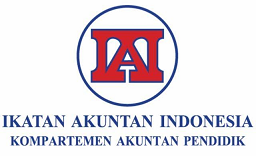KEBIJAKAN PENGECUALIAN PAJAK DIVIDEN: KABAR BAIK ATAU BURUK BAGI INVESTOR
Abstract
The issuance of Omnibus Law Policy is predicted to be an effective policy in simplifying regulations, especially in the field of taxation. This study aims to find out in depth the perceptions of various parties regarding the implementation of PMK No. 18 regarding Exceptions from the Imposition of Income Tax on Dividends. Researchers try to map the problem from various perspectives, including investors, securities companies, tax consultants, tax officials and academics. The research was conducted using a qualitative approach with structured interview techniques. The results show that this Exemption of Dividend Tax policy is beneficial for corporate taxpayers, while for personal taxpayers it still tends to be detrimental because the administration is too complicated. So that policy makers need to review the implementation of Minister of Finance Regulation. In addition, the results of the study also show that although in the short term this policy has the potential to reduce Government revenues from the tax sector, in the long term this policy has the potential to accelerate national economic growth, especially after the Covid-19 pandemic. This research can be a reference for the government and academics in implementing policies in the field of taxation.
Downloads
References
Asshidiqi, Fahmi & Irawan Ferry. (2021). Pengaturan Pembebasan Pajak Dividen Dalam Undang-Undang Cipta Kerja Berdasarkan Asas Keadilan dan Asas Kemanfaatan. Jurnal Kertha Semaya, 9(10), 1917–1931. https://doi.org/https://doi.org/10.24843/KS.2021.v09.i10.p16
Billings, B. A., Lee, C., & Lee, J. (2018). Dividend Tax Policy and Private-sector Research and Development Spending: A Modified Perspective on the Impact of US 2003 Tax Reform Act on R&D Spending. In Advances in Taxation. Emerald Publishing Limited.
Chay, J. B., Chong, B. U., & Im, H. J. (2022). Dividend taxes and investment efficiency: Evidence from the 2003 US personal taxation reform. Journal of Accounting and Economics, 101514.
Darussalam dkk. 2020. Omnibus Law Ketentuan dan Fasilitas Perpajakan Untuk Penguatan Perekonomian. Maret. https://ddtc.co.id/policynote/policynote-01/mobile/index.html
Donohoe, M. P., Jang, H., & Lisowsky, P. (2022). Competitive externalities of tax cuts. Journal of Accounting Research, 60(1), 201-259.
Fauzan, F., Ibrahim, M., & Jahja, A. S. A Scholarly Examination of Tax Compliance: A Bibliometric Analysis (1960-2021). Journal of Indonesian Economy and Business, 37(1), 52-72. https://doi.org/10.22146/jieb.v37i1.2718.
Ferris, E. E. S. (2018). Dividend taxes and stock volatility. International Tax and Public Finance, 25(2) 377-403.
Fernando, Aldo. 2021. Geser Asing! Lokal Juara Transaksi Saham, Milenial Bintangnya. 8 Maret 2021. https://www.cnbcindonesia.com/market/20210305083807-17-227999/geser-asing-lokal-juara-transaksi-saham-milenial-bintangnya/2
Fitriandi, P., Setiawan, B., & Widodo, A. (2018). Pajak Berganda Secara Ekonomis Atas Penghasilan Dividen di Indonesia dan Alternatif Penyelesaiannya. Jurnal Pajak Indonesia, 2, 68.
Ganar, Yulian Bayu (2018). Pengaruh Kebijakan Dividen Dan Profitabilitas Terhadap Nilai Perusahaan Pada Perusahaan Yang Terdaftar Di Bursa Efek Indonesia Periode 2013-2017. Jurnal Sekuritas (Saham, Ekonomi, Keuangan dan Investasi) ) 2 (1).
Harmono. 2014. Manajemen Keuangan Berbasis Balanced Scorecard Pendekatan Teori, Kasus dan Riset Bisnis. Jakarta: PT Bumi Aksara.
Isakov, D., Pérignon, C., & Weisskopf, J. P. (2021). What if dividends were tax-exempt? Evidence from a natural experiment. The review of financial studies, 34(12), 5756-5795.
Lubis, Pardamean , dan Salman bin Zulam. 2017. “Analisa Faktor-Faktor Yang Mempengaruhi Investasi Di Indonesia.” Jurnal Perspektif Ekonomi Darussalam Vol. 2, No. 2, hal. 147-166.
Mardiasmo. (2011). Perpajakan Edisi Revisi 2011. Penerbit Andi.
Mohdali, R., & Pope, J. (2014). The influence of religiosity on taxpayers’ compliance attitudes: Empirical evidence from a mixed-methods study in Malaysia. Accounting Research Journal, 27(1).
Moleong, L. (2007). Metodologi Penelitian Kualitatif. Bandung: PT. Remaja Rosdakarya
Peraturan Menteri Keuangan Republik Indonesia Nomor 18 /Pmk.03/2021 tentang Pelaksanaan Undang-Undang Nomor 11 Tahun 2020 tentang Cipta Kerja di Bidang Pajak Penghasilan, Pajak Pertambahan Nilai dan Pajak Penjualan atas Barang Mewah, serta Ketentuan Umum dan Tata Cara Perpajakan
Saragi, S. (2020). Analisis Penurunan Penerimaan Pajak Akibat Pembebasan Bersyarat Pajak Dividen Bagi Wajib Pajak Badan dan Orang Pribadi di KPP Pratama Jakarta Kebayoran Baru Dua.
Sari, D. (2013). Konsep Dasar Perpajakan.
Sartono, A. (2008). Manajemen keuangan teori dan aplikasi. BPFE Yogyakarta.
Seligman, E. R. A. (1925). Essays in Taxation (10th ed.). MacMillan.
Sommerfeld, R. M., Anderson, H. M., & Brock, H. R. (1972). An Introduction to Taxation. Harcourt College Publishers.
Suryahadi, Akhmad. (2021). Analis: Pembebasan pajak dividen bisa mencegah capital outlow. Kontan.co.id. edisi tangga 2 Maret 2021. https://amp.kontan.co.id/news/analis-pembebasan-pajak-dividen-bisa mencegah-capital-outflow
Ulinnuha, M., Susilowati, D. E., & Hana, K. F. (2020). Persepsi Investor Pemula Terhadap Pembelian Saham Syariah di Indonesia. Jurnal Ilmu Ekonomi Dan Bisnis slam, 2(1), 1–14.
Undang-Undang Nomor 11 Tahun 2020 tentang Cipta Kerja
Undang-Undang Nomor 16 Tahun 2009 tentang Penetapan Peraturan Pemerintah Pengganti Undang-Undang Nomor 5 Tahun 2008 Tentang Perubahan Keempat Atas Undang-Undang Nomor 6 Tahun 1983 Tentang Ketentuan Umum dan Tata Cara Perpajakan Menjadi Undang-Undang.
Utomo, Bambang Sakti Aji. 2009. Pengaruh Kebijakan Hutang, Kebijakan Investasi dan Kebijakan Dividen Terhadap Nilai Perusahaan Manufaktur Terdaftar di Bursa Efek Indonesia Tahun 2003-2007.
Wijaya, S., & Melati, P. (2021). Income Tax On Dividend In Job Creation Law. Bilancia: Jurnal Ilmiah Akuntansi, 5(4), 408–416.

This work is licensed under a Creative Commons Attribution-NonCommercial-ShareAlike 4.0 International License.
Jurnal Akutansi dan Keuangan allows readers to read, download, copy, distribute, print, search, or link to the full texts of its articles and allow readers to use them for any other lawful purpose. The journal allows the author(s) to hold the copyright without restrictions. Finally, the journal allows the author(s) to retain publishing rights without restrictions
Authors are allowed to archive their submitted article in an open access repository
Authors are allowed to archive the final published article in an open access repository with an acknowledgment of its initial publication in this journal







